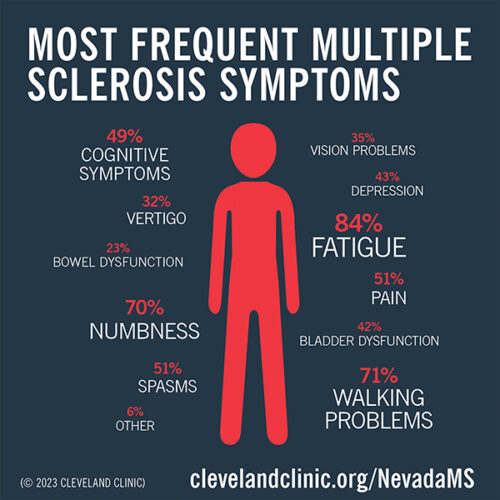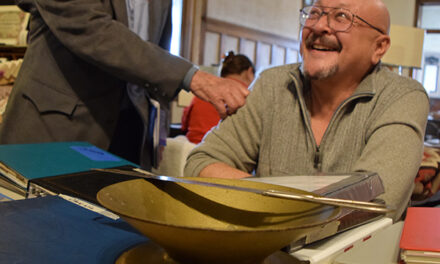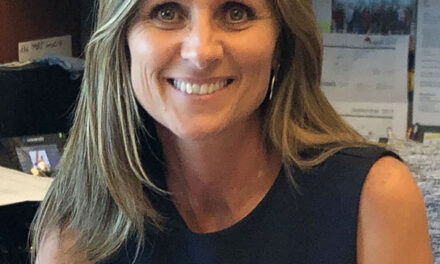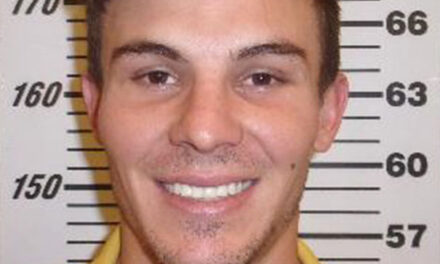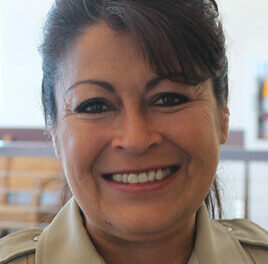LOS LUNAS — As a busy career mom raising a son on her own, Alison Lopez didn’t think much of the strange symptoms she experienced intermittently over the years.
“As a busy woman, you always chalk it up to stress or a pinched nerve and you kind of just overlook these things,” Lopez said.
She was born in Belen and now resides in Los Lunas. After graduating from the University of New Mexico, she became a paramedic, then later a flight medic.
“What actually triggered me to go seek help was when I was on a call and I got so dizzy and so hot that I passed out,” she said. “When I came back, my colleagues were very concerned.
“I thought something is wrong. You don’t have numbness and tingling in your extremities and all these other symptoms like dizziness, decreased vision and heat intolerance for nothing.”
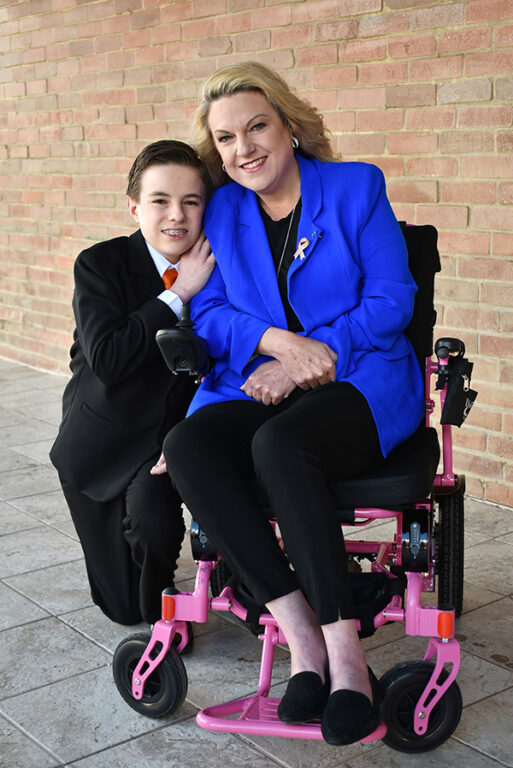
Felina Martinez | News-Bulletin photo
At age 40, Alison Lopez was diagnosed with multiple sclerosis. Her son, Tylor, 14 years old, is her primary caregiver.
Begrudgingly, Lopez sought help from doctors, who ran tests. In 2018, at age 40, she was diagnosed with multiple sclerosis.
MS is a chronic autoimmune disease of the central nervous system that causes the immune system to attack cells in the myelin, the protective sheath that surrounds nerves in the brain and spinal cord. Damage to the myelin interrupts nerve signals from the brain to other parts of the body.
“There’s not a specific MS or brain center here in New Mexico. To confirm the diagnosis, I flew out to one of the largest and best brain health centers in the country, the Cleveland Clinic Lou Ruvo Center for Brain Health in Las Vegas, Nev.,” she said
Lopez said the confirmation of the diagnosis was, at first, truly devastating.
“I had it in my head that my life was over. I called my mother and she said, ‘You are not allowed to live in that dark space. You can visit it, but then pull yourself together and remember that you have a small child to take care of, and a full life ahead of you to live,’
“She told me this is just the beginning of my new life, like my second birthday, and that this is not an end. She was absolutely right,” Lopez said.
“MS is not what it used to be years and years ago. You can still live a full, productive and amazing life. What gave me the most relief was that it wasn’t just a diagnosis, it was yes, there is no cure, but it’s treatable,” Lopez said. “We were able to start the process of grieving the loss of what we had, and accepting the new life that we were going to lead.”
Tylor was 8 years old at the time of his mother’s diagnosis.
“I said, ‘This is where we are today; we don’t know what tomorrow is going to look like, and we’re going to take it as it comes. No matter how scary or awful it is, we will get through it together,’” said Lopez.
Tylor, who is now 14 years old and a high school sophomore, said he just figured it would be a new normal.
“It was very gradual, so it didn’t feel like too big of a change,” Tylor said of his mom’s disease. “I do say I worry a little more than I used to, but if she’s not doing great that day then OK, we adapt to that day.”
Since Alison’s diagnosis, Tylor has stepped-up to become her primary caregiver. He routinely assists with administering her medications and helping her get around.
Lopez said Tylor taking on the role of her primary caregiver evolved naturally and out of necessity.
“My mom is available and wonderful. She does everything she can, but she’s in her mid 70s so there’s limitations on her, too,” she said. “Some days are really good and I don’t need a lot of help, but with MS you get brain fog sometimes and can’t ‘adult.’ I certainly don’t try to overload him with it, but it’s nice to know if I need it he can do it.”
“We have to keep the caregivers in mind, especially one as young as Tylor,” said Dr. Carrie Hersh, Lopez’s neurologist and director of the Multiple Sclerosis Health and Wellness Program at LRCBH.
“I made it a priority to ensure we understood his unique needs,” Hersh said. “Caregivers often play a critical role in supporting individuals with MS to be independent and improve their quality of life. But it’s also important to recognize their needs and provide them with the tools and support they require to manage their responsibilities, while maintaining their own well-being.”
Hersh said occupational therapists at LRCBH have met with Tylor and taught him customized interventions and approaches to help his mom manage day-to-day tasks. The clinic also provides him additional educational resources tailored to his needs.
“I’m just her son doing what needs to be done. I’m proud going to bed at the end of the day knowing I took care of my loved one,” the teenager said. “Though, I do tell her when I need a break. At first I was scared to say I can’t right now, but I’ve grown up to it and we have that strong bond, so I can say, ‘Maybe not today, but tomorrow,’ because we all need our time.”
“It’s a package deal,” Lopez said. “He accepts me and, I accept him. We make a great team.”
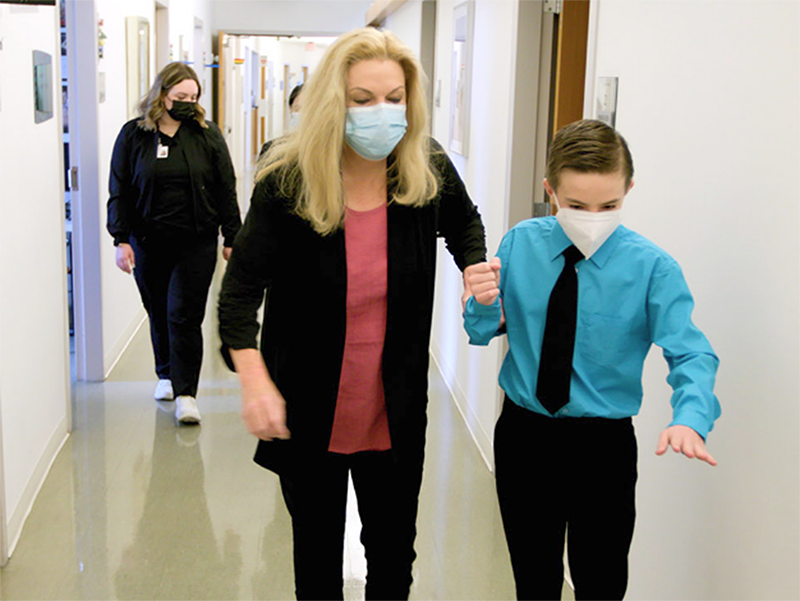
Photo courtesy of Cleveland Clinic
Tylor Lopez helps his mom, Alison, during an appointment at the Lou Ruvo Center for Brain Health.
Lopez said her and Tylor’s unique journey together has shown her what pure, honest kindness looks like.
“He gives me sunshine every day,” Lopez said looking at her son with a warm smile. “Tylor is my hidden hero and I don’t want him to be hidden any longer.”
Since the diagnosis, the duo has been busier than ever after making it their mission to shine a light on the disease and the hidden heroes who work behind the scenes.
“We have a unique family dynamic and so we have a unique story to tell,” she said. “I think it’s important for everyone to hear not just our story but what’s available to them so they don’t feel alone.”
Lopez said she wouldn’t be where she is today had she just accepted a straight-forward clinical diagnosis, which is why she wants to emphasize the comprehensive care she receives at LRCBH.
“Body, mind and soul — they covered it all,” she said. “They work with your local hospitals, neurologists and therapists and make sure you have everything you need to be successful in your treatment.”
Hersh noted the clinic strives to have a multidisciplinary approach to treating MS because it’s a complex disorder and the symptoms that accompany it aren’t always apparent.
“Symptoms such as pain, fatigue and cognitive impairment aren’t something we can always look at someone and see, but they can have a profound impact on quality of life, day-to-day function,” Hersh said.
“More than half of people living with MS also struggle with mood disorders,” said Hersh. “That is why emotional support is an essential part of managing this disease. We offer several therapeutic and support services to help address this.”
The LRCBH also plays an integral role in developing new MS drug therapies.
“These include disease-modifying therapies that can improve outcomes by reducing disease activity and progression in MS. Our next phase of research is focusing on protecting the brain from previous damage, potentially restoring function and repairing injury to nerves,” said Hersh.
Lopez said it’s important not to delay in getting diagnosed if you’re experiencing symptoms. For those already diagnosed, she advises seeking a full body-and-mind approach to medical care and being perseverant.
“I think, unfortunately, with any disease, people can get mired down in having a bad day, but it always ends and always gets better,” she said.
“Take one day at a time,” Tylor continued. “If that day and moment isn’t good, that next day can be better.”
Multiple Sclerosis programs and resources
Cleveland Clinic Nevada:
National Multiple Sclerosis Society
Multiple Sclerosis Society of America
Felina Martinez was born and raised in Valencia County. She graduated from the University of New Mexico in 2021. During her time at UNM, she studied interdisciplinary film, digital media and journalism. She covers the village of Los Lunas, Los Lunas Schools, the School of Dreams Academy and the town of Peralta.
